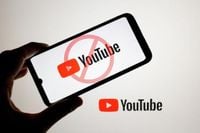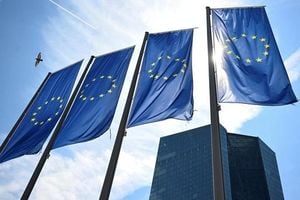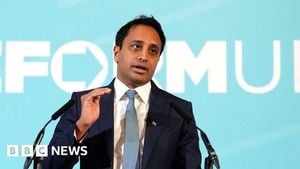In a move that’s sent shockwaves through both the tech world and political circles, Google’s YouTube has announced it will allow previously banned creators—ousted for alleged COVID-19 and election misinformation—to return to the platform. This policy reversal, revealed in a letter sent to the House Judiciary Committee on September 23, 2025, comes after years of mounting pressure from lawmakers and a broader public reckoning over free speech, content moderation, and the role of government in shaping online discourse.
According to multiple reports, including coverage by the New York Post, The Hill, and Associated Press, the shift follows a lengthy investigation led by House Judiciary Committee Chairman Jim Jordan (R-Ohio). The committee’s oversight and subpoena compelled Google to admit that its COVID-era content moderation was, at least in part, a response to “repeated and sustained outreach” from senior Biden administration officials. These officials, Google acknowledged, pressed the company to remove user-generated content—even when it did not violate YouTube’s own policies.
Alphabet, Google’s parent company, stated in its letter, “Senior Biden administration officials, including White House officials, conducted repeated and sustained outreach to Alphabet and pressed the company regarding certain user-generated content related to the COVID-19 pandemic that did not violate its policies. While the company continued to develop and enforce its policies independently, Biden administration officials continued to press the company to remove non-violative user-generated content.”
The company’s attorneys went further, labeling the government’s pressure “unacceptable and wrong.” The letter, as cited by The Hill, stressed, “It is unacceptable and wrong when any government, including the Biden Administration, attempts to dictate how the Company moderates content, and the Company has consistently fought against those efforts on First Amendment grounds.”
The fallout from these admissions is significant. YouTube will now offer a pathway for creators previously banned for violating COVID-19 and election integrity policies—rules which are no longer in effect—to rejoin the platform. Among those affected are high-profile conservative voices such as Dan Bongino, Sebastian Gorka, and Steve Bannon, all of whom had been removed in recent years after being flagged for repeated violations of the now-rescinded policies. According to The New York Post, these users “will now be able to rejoin the platform.”
For creators, the implications are more than symbolic. As AP noted, access to YouTube’s monetization features can mean substantial income, with ad revenue serving as a primary source of earnings for many. The company’s decision, Alphabet wrote, reflects its “commitment to free expression,” and it recognizes that “conservative voices... have extensive reach and play an important role in civic discourse.”
The debate over content moderation is hardly new, but the explicit admission of government pressure marks a dramatic escalation. As Robby Soave of The Hill observed, “This is a massive win for free speech, as well as an acknowledgement that those of us who objected to the government bullying tech companies were right all along.” Soave also recounted his own experience: in March 2022, The Hill’s YouTube channel was suspended for a week after airing footage of Donald Trump claiming the 2020 election was stolen. The channel had simply reported Trump’s statement, not endorsed it, but was nonetheless penalized under rules now acknowledged to have been misguided.
The controversy echoes broader complaints from tech executives. Meta CEO Mark Zuckerberg has previously accused the Biden administration of pressuring Facebook to censor content during the pandemic. Elon Musk, owner of X (formerly Twitter), has also alleged illegal coercion by the FBI to suppress stories about Hunter Biden. The Supreme Court weighed in last year, siding with the Biden administration in a dispute over the federal government’s role in combating controversial social media posts.
Yet, as Brian Lilley, a veteran Canadian broadcaster, pointed out in his commentary, this episode is not simply a tale of a single administration’s overreach. He drew a contrast between the Biden White House’s sustained campaign and more routine, if sometimes controversial, network decisions—such as ABC’s temporary suspension of Jimmy Kimmel after inflammatory remarks. “The Biden administration had a sustained attack on free speech over several years,” Lilley wrote, arguing that the government’s actions went far beyond typical editorial disputes.
Not everyone is convinced the policy reversal is a net positive. AJ Dellinger at Gizmodo cautioned, “YouTube Is Going to Regret This,” arguing that the company “has opened the floodgates now, and the Right will make a point of holding the company to a promise that it technically didn’t make, as ‘an opportunity’ to rejoin the platform is not the same as a guarantee, nor is it an invitation to ignore the rules.” Dellinger’s skepticism reflects a broader concern that restoring banned accounts could lead to a resurgence of misinformation, especially as the 2026 midterm elections approach.
Alphabet’s response to these anxieties has been measured. The company emphasized that while it will not use third-party fact-checkers, it remains committed to enforcing its current medical misinformation policy. YouTube has phased out its standalone COVID-19 content restrictions, and election-related content is now subject to updated guidelines. The company also announced a “limited pilot project” for reinstating some terminated creators, indicating a cautious, phased approach rather than a blanket amnesty.
The political context surrounding these decisions is complex. As AP reported, tech CEOs, including Alphabet’s Sundar Pichai, have recently sought closer ties with the Republican president, attending events in Washington and making high-dollar campaign donations. This outreach comes as Republicans, led by Jordan, have accused the Biden administration of unfairly wielding its power to chill lawful online speech. The rollback of content moderation policies, then, is both a response to congressional pressure and a reflection of shifting political winds.
For many, the episode is a stark reminder of the delicate balance between combating misinformation and upholding free speech. While some hail YouTube’s move as a victory for open debate, others worry it may open the door to renewed waves of misleading or harmful content. As the company navigates these treacherous waters, the eyes of both Washington and the wider world are fixed firmly on Silicon Valley.
In the end, YouTube’s decision to welcome back banned creators marks a turning point in the ongoing battle over speech, censorship, and the responsibilities of tech giants. Whether this experiment in free expression leads to greater civic discourse or new controversies remains to be seen—but for now, the digital airwaves are once again open, and the debate rages on.




